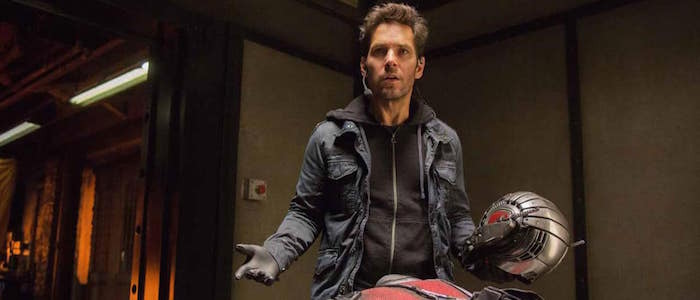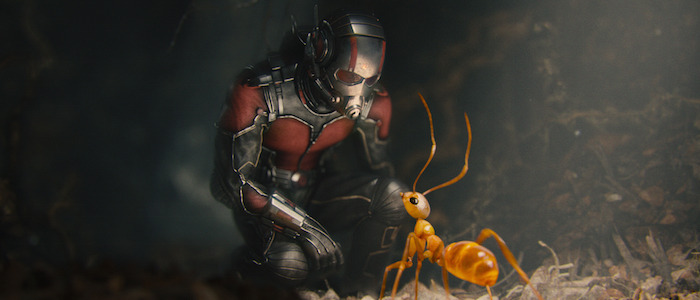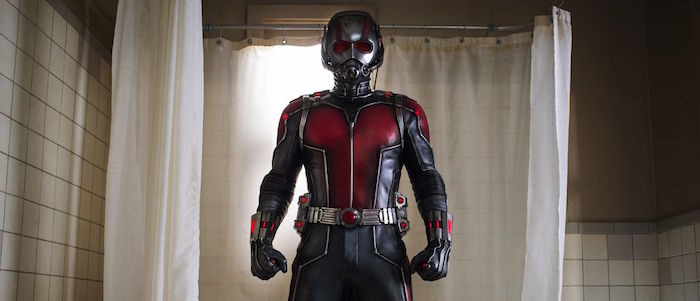With 'Ant-Man,' Marvel Goes Small, Simple And Sincere
(Welcome to Road to Infinity War, a new series where we revisit the first 18 movies of the Marvel Cinematic Universe and ask "How did we get here?" In this edition: Ant-Man is sometimes muddled, but charm and style go a long way.)
While "superhero fatigue" is by no means a cultural phenomenon – Avengers: Infinity War could topple Star Wars: The Force Awakens at the opening weekend box office – it's most certainly experienced on an individual basis. The bloated Avengers: Age of Ultron, for instance, may not have been everybody's cup of tea despite being one of this writer's favourites. Which is perhaps why Marvel Studios, in order to end its run of "Phase 2" films in 2015, decided on a smaller, more intimate project in the vein of a studio comedy.
Ant-Man would've been very different under director Edgar Wright, who left the project over creative differences in 2013, but that hypothetical scenario assumes there would've been an Edgar Wright Ant-Man at all – that is, once The Avengers swept the globe and the Marvel Creative Committee under Ike Perlmutter was still intact. The Marvel Studios of 2015 was a different beast from the Marvel Studios of 2003 (when Wright first got involved), and while it's nice to imagine what could have been, Peyton Reed of Yes Man and Bring It On did an ample job with a film that, for better or worse, seems more in his wheelhouse than Wright's. (Side note: the visual flourishes people seem to think are Wright's are likely Reed's doing, though the film feels like the product of conflicting rewrites).
That said, it does make us ponder whether going smaller and more personal in theory is really more artistically sound when the decisions still feel like they've had their edges sanded down. Like the character leading it, it's tough for Ant-Man to be truly good when forces beyond its control seem to hold it back at every turn.
Scott Lang, Ant-Man 2.0
Paul Rudd brings a boyish charm to any character he plays, and his "Aw, shucks!" demeanor is the perfect fit for Ant-Man. On the other hand, is this Ant-Man story the perfect fit for his character, Scott Lang? Scott's entire journey pivots around being worthy of the heroism his daughter already sees in him. It's a nice sentiment, one he's reminded of by both his ex-wife (Judy Greer) and mentor Hank Pym (Michael Douglas), but it's a journey that feels disconnected from the story framed around it.
Scott is an expert burglar with an understanding of the ins and outs of security, but these logistics are distinctly at odds with how the film paints his morality. Scott has thieving skills, but he only stole the one time. Not only that, he did so from a company that had fired him and he returned large sums to the people this company had swindled. He's lauded for this one-off act by several characters, but others in the film treat him like a repeat offender when he gets out of prison, like stealing is a habit he can't shake long enough to re-enter his daughter's life, and one he's fallen back on multiple times. It isn't. The film feels cobbled together from entirely different drafts and results in entirely different Scott Langs depending on who you ask, but the problem here isn't some easily ignored factual plot hole about his past.
The problem is Scott Lang himself. Or rather, the way in which his story is contextualized. It's hard for a convicted felon to find work, a punishment for his one-time act of recklessness and one he doesn't feel like he deserves. His sincere attempts to keep his job make him instantly sympathetic, though as we all know by now, "Baskin Robbins always finds out, bro." On the other hand, when Scott shows up to his daughter's birthday party, he talks about having gone straight, as if his past involves a criminal lifestyle and not a singular act of Robin Hood vigilantism. The problem therein becomes not only about who Scott Lang is and what kind of life he comes from, but what he even needs to change about himself in order to be worthy of his daughter's adoration. Is he a good person who made a singular mistake and needs to claw his way back? Or is he a repeated criminal who needs to leave his old life behind and radically change his ways?
The films seems to want it both ways, and it can't figure out how to articulate what Scott's arc actually is, given that Hank Pym hires him to steal for a worthy cause once more. His Ant-Man heist certainly involves him putting his skills to good use, but he's someone willing to put his life on the line for his daughter right from the get-go. There's nothing about his story that involves him attaining a new sense of worth or heroic stature, or doing anything he wouldn't have done at the beginning of the film – despite the need for change receiving constant lip service, by everyone from Hank to his ex-wife's husband (Bobby Cannavale). And yet, the film manages to get by on a texture of sweetness alone despite this central contradiction.
Family and Legacy
Ant-Man is a film about fathers trying to be better in their daughters' eyes. That's an idea far more potent than most Marvel films put together, and even if its execution falls by the wayside, this idea has enough momentum to see the film through. What Scott actually needs to learn for his daughter Cassie's sake is essentially a moot point, but the film's climax eventually shifts to her bedroom. He becomes the hero she believes him to be – in the most literal sense; he shows up in a superhero outfit and fights a bad guy – despite there being no substantial change to who he is as a person.
The bad guy in question, Corey Stoll's Yellowjacket/Darren Cross, has to contend with his own form of disappointment. All he's ever wanted was to be worthy of his father figure Hank Pym, but he's never quite understood Hank's pain or why he buried the Ant-Man project. Cross is a selfish man, thinking only about his own relationship to his mentor while refusing to acknowledge the frayed dynamic between Hank and Hank's own daughter, Hope Van Dyne (Evangeline Lilly). Hank, the first Ant-Man, recruits Scott because he sees himself in him. Their mutual desire to be worthy of their daughters' love turns the idea of Ant-Man into more than just a superhero costume. This shared identity becomes a means to prove themselves not just as good heroes, but good fathers.
Just as there's disconnect for Scott, there's disconnect for Hank, too. He does little to actually make up for his aloofness during Hope's childhood mourning, but the focus is put squarely on the revelation about her mother's disappearance into the quantum realm and Hank's subsequent search to find her. All Hank has to do is tell Hope the truth about her mother and he's forgiven – which is a nice sentiment, but it feels emblematic of a film that keeps narratively kneecapping itself, since his revelation could easily come at any other point in the narrative. Neither Scott nor Hank have to go through any substantial arc to become worthy. Darren Cross is said to have been driven mad by his experiments, but there's no sense of who the pre-madness Cross was or how his behavior is now different. Hope is arguably the only character with any recognizable dramatic shift, but she's sandwiched between the two Ant-Men, with Scott helping her recognize Hank's love and protectiveness, and doing little else but training Scott.
Yet somehow, Ant-Man still manages to pull through despite being one of Marvel's most muddled films, in large part because it's also one of their most visually potent.
Execution
Peyton Reed is a hell of a director. He makes Ant-Man consistently, thoroughly watchable despite its lack of distinct through-line, and much of it has to do with it being a genuinely funny film with a sense of warmth. Outside of all the rote exposition involving Hank and Hope, Ant-Man is filled to the brim with love and camaraderie. Whether it's the catterbox Luis (Michael Peña) and his excitable crew, feeling like they've stepped out of the pages of a children's funnybook, or the likes of Cassie Lang (Abby Ryder Fortson), the kind of mischievous imp who would be reading one of their comics, every supporting character seems to have a genuinely lovable quality, in large part because they seem to act out of love in the first place.
The thieves get along with each other famously, and their thievery is never at the cost of their humanity – Luis even stops mid-mission to clarify whether they're truly the "good guys." Cassie just wants her dad. Scott just wants to be with Cassie. Even Scott's ex-wife Maggie and her husband Paxton set strict terms for Scott's visitation out of a sense of duty to their daughter. They hope Scott will become a better man for Cassie's sake, and when he proves himself a hero, he's welcomed back into their home.
What's more, Peyton Reed fittingly knows how to time the little movements. Whether it's characters making sudden moves – a punch, a flinch, or even a look of disbelief – or a camera moving rapidly within a tight space – a jail cell or within the confines of circuit board when Scott has shrunk down – the film's lack of a precise theme or narrative feels almost made up for by its precise action. Except for a seemingly obligatory Avenger cameo, the action in Ant-Man is limited to 1) Thieving, and 2) Training for said thieving, all of which are imbued with a sense of excitement and urgency even though there's no real ticking clock.
And of course, I'd be remiss in failing to mention that this is the first Marvel film – Hallelujiah! – to have a clear and explicit political perspective! It's only ever really articulated in the form of Darren Cross' demonstration video for S.H.I.E.L.D./H.Y.D.R.A. and the U.S. military, but the reel in question is a satirical look at the freedom-centric, sanitized language used by the military industrial complex while the images on screen are of insect-like humanoids carrying out terrifying acts of war and assassination. In fact, the film's articulation of its politics might be the most precise thing in the movie while also being the funniest. Cross wants to weaponized his tech. The Ant-Men want to destroy it, and they especially want to keep it out of the hands of Tony Stark. It's as simple as that.
Simple is, in fact, the word that best describes Ant-Man. It's a film that falls short of its goals of dramatizing any substantial redemption, even reducing Scott's key dramatic moments during his training to mere throwaway cuts. But it's in the purity of its characters' intent and the genuine sense of fun imbued into every scene that the film finds breathing room elsewhere. It's a film that colours within the margins of the Marvel Cinematic Universe, fleshing out its history and the people who lives outside the Avengers' immediate radius, and it does so by introducing a supporting cast who, for better or worse, feel like absolute musts in the sequel.
While it's unfortunate the film's leads aren't equally exciting, Michael Peña's Luis, Abby Ryder Fortson's Cassie, T.I.'s Dave and David Dastmalchian's Kurt will in fact be re-joining the main cast for Ant-Man and the Wasp later this year. (Surely I can't be the only one who wants Luis to recap the events of Infinity War?)



